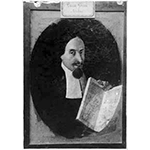Luca Ghini
Born in the vicinity of Imola, he completed his university studies in Bologna, where he began his career as reader in practical medicine. In constant disagreement with the local Academic Senate, he moved to Fano where he stayed until the University of Bologna decided, in 1539, to institute a Chair "de simplicius medicinalibus". Its teaching remained, however, subordinate to the Chair of Medicine, to the point that Ghini was unable even to obtain permission to create an "Orto dei Semplici", or garden of medicinal herbs, for the university. It was due to these difficulties that, in 1543-1544, he decided to accept the post at the University of Pisa offered him by Grand Duke Cosimo I de' Medici (1519-1574). Thanks to the work of Ghini, first the University di Pisa and then that of Florence were able to establish botanical gardens. Ghini is also attributed with the merit of having been among the first to utilise, along with illustrated herbariums, those made up of dried herbs. Some of the most outstanding botanists of the 16th century studied under his guidance, among them Andrea Cesalpino (1519-1603) and Ulisse Aldrovandi (1522-1605). As Ghini never published any of his writings, few of them have survived; among those that have, we may mention, in addition to the Lezioni sul morbo gallico [Lessons on the Gallic disease], some plates that were included in the herbarium of Leonhart Fuchs (1501-1566).
Last update 04/gen/2008




